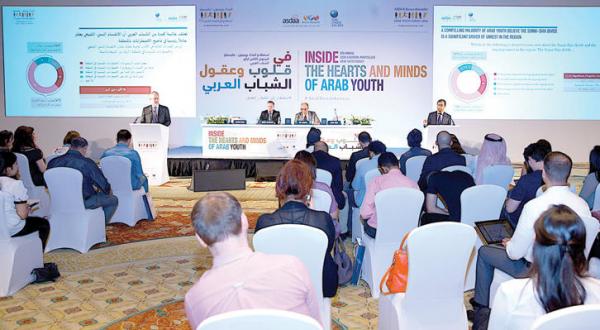Dubai-For the fifth consecutive year, Arab youth consider Saudi Arabia as their country’s major ally, highlighting their continued trust in the Kingdom as regional tensions peak, according to the findings of the 8th Annual ASDA’A Burson-Marsteller Arab Youth Survey, which was released on Tuesday in Dubai.
When asked about their country’s main ally, Arab youth cited Saudi Arabia, which took the first place with 31 percent, followed by the UAE with 28 percent and the US with 25 percent.
A majority of the youth in other Gulf countries totaling 93 percent regarded the Kingdom as their main ally.
Young Arabs in the Levant and Yemen have the least favorable view for the kingdom, with only 45 percent viewing it as an ally.
Overall, 70 percent of young Arabs consider Saudi Arabia as an ally to their countries in this survey.
Commenting on the survey findings, the CEO of ASDA’A Burson-Marsteller Sunil John said during the press conference: “The ASDA’A Burson-Marsteller Arab Youth Survey provides a unique insight into the hearts and minds of the region’s largest demography, which is estimated to be 200 million youth. This year’s survey reveals once again that young people are acutely aware of the changing political facts in the region.” “Saudi Arabia has long been a powerful player in the region, and young people throughout the Arab world recognize the key role the Kingdom plays in trying to ensure stability and security not just within its own borders but throughout the Middle East and North Africa,” John added.
In addition, the UAE is also seen favorably by the majority of Arab youth, with 72 percent viewing it as an ally and 28 percent saying it is their top ally; whereas 93 percent of Gulf States’ youth view it as a supportive ally.
On the other hand, Arab youth were generally mixed in their views regarding the United States.
While two-thirds, 63 percent, of young Arabs view the country as an ally, third of youth see the country as an enemy, especially in Iraq with 93 percent, Yemen 82 percent and Palestine 81 percent.
Twenty-two percent of young Arabs, nearly one in four, cite the UAE as the country they would most like to live in, and just as many say it is the country they would most like their country to emulate.
The UAE is also the most attractive country for potential entrepreneurs: Of the young Arabs who intend to start their own business in the next five years, a quarter would choose to set up shop in the UAE if they could.
For his part, HH Sheikh Mohammed Bin Rashid Al Maktoum, UAE Vice President and Prime Minister and Ruler of Dubai, welcomed the findings of the Survey of the Arab youth saying: “The UAE was ranked by Arab youth as their preferred regional startup location and as the first location to live and work in. Our message to them is: You are most welcomed.”
A small majority of Arab youth, 52 percent, view regional rival Iran as an enemy, although 38 percent of young Arabs see it as an ally and, for the first time, a small number, 13 percent, see Iran as their country’s biggest ally in the region.
The survey showed that overwhelming majorities of Arab teens and young adults now strongly oppose the terrorist group ISIS, with nearly 80 percent ruling out any possibility of supporting it, even if it were to renounce its brutal tactics.
A year ago, about 60 percent expressed that view, according to the 16-country survey released on Tuesday.
The new poll, based on face-to-face interviews with 3,500 respondents aged 18 to 24, suggests that young Arabs are both increasingly fearful of the terrorist group and less swayed by its propaganda, compared with previous years.
More than half the participants ranked ISIS as the major problem facing the Middle East, and 3 out of 4 said they believed that the group would ultimately fail in its quest to establish an Islamic caliphate in Iraq and Syria.
Arab youths believe that unemployment and poor economic prospects are main reasons behind signing up with ISIS.
The survey, taken in January and February of this year, also shows growing disillusionment with the Arab Spring uprisings that began in 2011.
The share of survey participants who said they have seen improving conditions since the uprisings dropped from 72 percent in 2012 to 36 percent this year.
Accordingly, respondents tended to rank stability over democracy as a coveted virtue for an Arab state.
